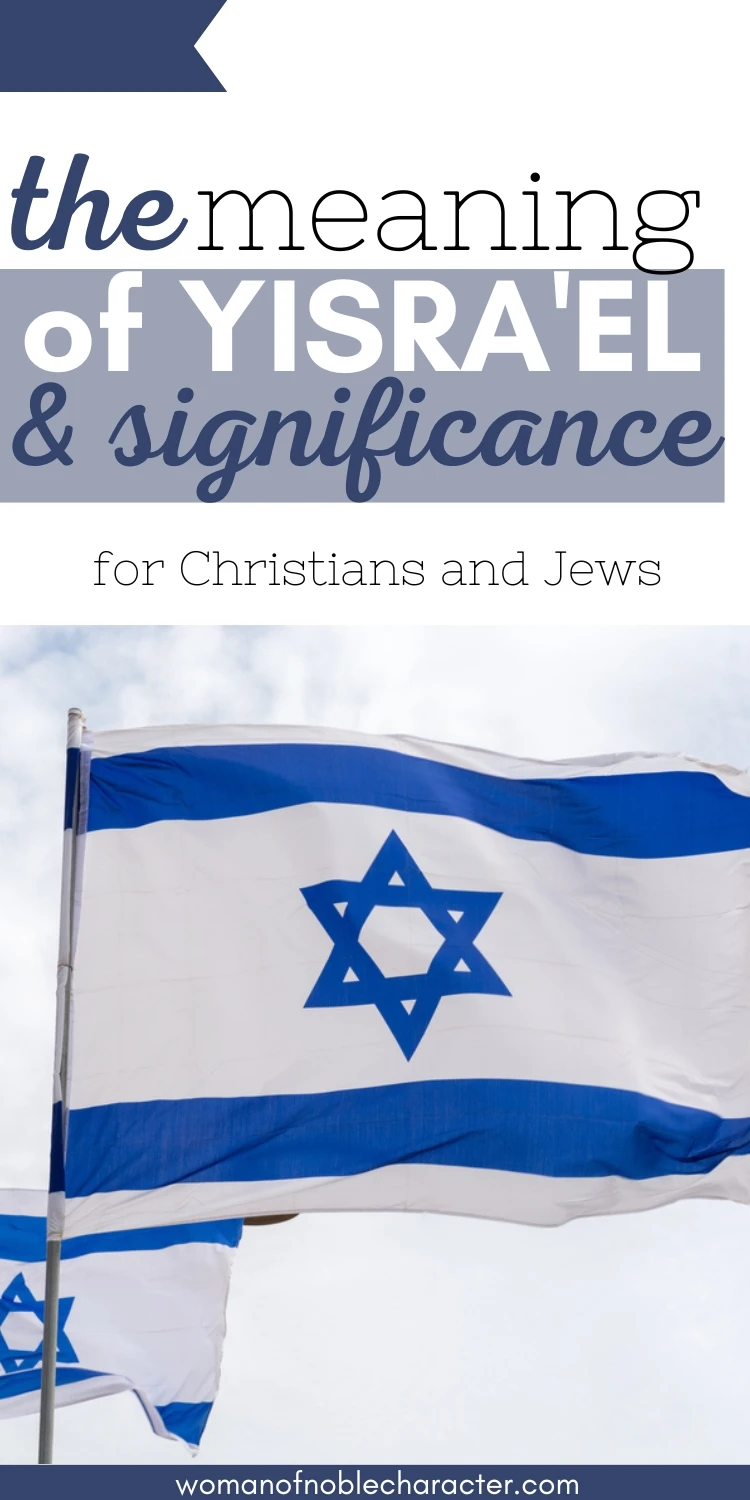This page/post may contain affiliate links. As an Amazon Associate, as well as an affiliate of other programs, this means if you purchase something using these links, I will receive a commission on qualifying purchases at no cost to you! For more detailed information, please visit our Affiliate Disclaimer page
YIsra’el Meaning
Do you know what Y’Isra’el means? It is an ancient word with deep spiritual significance that has been used to refer to the Jewish people for millennia.
Y’Isra’el is often translated to “God-wrestlers,” and is derived from the story recounted in the bible of Jacob wrestling with an angel from God. Many feel that Y’Isra’el represents the struggle between faith and doubt, between our human limitations and the divine.
To understand the spiritual depth of this powerful word, you must explore its etymology, history, and relevance in the modern age. In this article, you will learn what Y’Isra’el means for Jews today and how this powerful word is still used to define Jewish identity.
Whether you are Jewish or not, this exploration of Y’Isra’el can bring valuable insight into the spiritual life and beliefs of the Jewish people.

Naomi, from the Artza Box, says, “The word Israel, in particular its Hebrew counterpart; Y’Isra’el (ישראל), is one of the most used words in the Old Testament (over 2500 times!), just after “The Lord,” and it is said to be one of the most important words in the Bible”
In Hebrew, the name Y’Isra’el combines two powerful words: Yisra, meaning “to contend with,” and El, believed to be a reference to God. Put simply, Y’Isra’el often translates to “one who contends with God.” To Christians, this phrase holds deep significance as we develop an understanding of our relationship with the Lord.
The story of Jacob wrestling with a divine being found in Genesis 32:22-32 is a powerful testimony of faith in the Bible.
Join us for our Bi-weekly Hebrew letter and Bible study!
Jacob enters the ring feeling vulnerable and powerless, yet after battling with God – or an angel – he emerges as Y’Isra’el, having overcome both the divine and the human worlds. This story resonates with Christians everywhere and is a source of hope and strength.
Yisra’el
yis-raw-ale’
Proper Name Masculine
Israel = “God prevails”
Yisra’el is:
- the second name for Jacob given to him by God after his wrestling with the angel at Peniel
- the name of the descendants and the nation of the descendants of Jacob
- the name of the nation until the death of Solomon and the split
- the name used and given to the northern kingdom consisting of the 10 tribes under Jeroboam; the southern kingdom was known as Judah
- the name of the nation after the return from exile
According to Jewish tradition, the name Y’Isra’el symbolizes not only Jacob’s encounter with the divine but also the ongoing struggles and triumphs faced by Jews and those with ancient Y’Isra’elite roots throughout history.
Today, both Christians and Jews can look to the story of Y’Isra’el to gain inspiration and strength in times of hardship.
When Jacob encountered an angel and their ensuing struggle caused his name to be changed from Jacob to Israel, the angel proclaimed, “Ki sarita im elokim va’anishim vatuchal — for you have battled with God and humans and emerged the victor!”
This emblematic story in the Christian faith serves as a reminder of the strength and resilience of faith in the face of adversity.
The use of the phrase “you strove” is particularly meaningful. Significantly, the Bible does not use ‘nilchamta,’ which means ‘you fought,’ but instead uses ‘sarita,’ meaning ‘you strove.’ This conveys the idea of struggling through a challenge or obstacle with grace and effort, rather than engaging in physical combat.
Rav Ahron Soloveichik (1917-2001, brother of the renowned Rabbi Joseph B Soloveitchik) highlights the difference between Nilchamta and physical force: the former implies a struggle of domination and subjugation, while the latter’s purpose is to overpower an opponent. The distinction is of particular importance, as it is essential to distinguish between moments of conflict.
The conflict may be over, but the loser does not have to remain vanquished. Sarita, a term derived from “sar,” meaning “prince” or “leader,” invites us to strive for leadership rather than victory. Rather than confrontation, this battle was decided through persuasion. For Christians and Jews alike, this can serve as a reminder to lead with grace and wisdom.
As the world contemplates what makes a good leader, Christians can look to Jewish teachings for guidance. According to Jewish tradition, a true leader is someone who strives to bring out the best in others and is unwavering in their determination.

A leader seeking to resolve conflicts looks beyond the surface and draws out the potential in others, exemplifying the highest tenets of faith. This approach encourages all to strive for peace, harmony, and understanding in the spirit of Christian and Hebrew conviction.
As a Yisrael, part of your historic mission is to strive to bring out the best qualities in yourself and others. Christians can take this same wisdom to heart, pushing to be the best versions of themselves in order to help elevate the world around them. Abraham Lincoln put it best when he said:
“We are not enemies, but friends. We must not be enemies. Though passion may have strained, it must not break our bonds of affection. The mystic chords of memory will swell when again touched, as surely they will be, by the better angels of our nature.”
Abraham Lincoln
“Yisrael” is not just a name but a title that a Jew can proudly carry when they reach their full potential in self-improvement and helping others. For the Christian, this is an inspiring example of how to live out faith-filled lives with purpose and passion.
The Land of Israel is a powerful symbol for the Jewish people, the entire community, and the hope for a brighter future. It is a source of strength for Am Yisrael, the home of Jerusalem, a promised Messiah, and the Temple. It is a beacon of light to the world and a unifying point of agreement for all of us. May it come soon.
People of faith recognize that, despite our differences, we all share the goal of making the world a better place. It’s why, when we come together, we strive to understand one another and appreciate the diverse perspectives and backgrounds that make up our community.
By learning about our differences, we are better equipped to work in solidarity and foster meaningful conversations and connections with our collective purpose in mind. The power of unity, in spite of our differences, can bring us closer to a brighter tomorrow.
Being a good and proud Jew (or Christian!) can mean more than standing with the state of Israel, wearing blue and white, and making aliyah. While these actions are certainly part of Jewish identity, there are also other elements that may be contradictory to them.
As Christians, we should strive to understand the multifaceted nature of Jewish life and be respectful of Jews who choose to express their faith in different ways.
The Land of Israel has an important—and, to many Christians, sacred—place in history. But few of us truly understand the various opinions of those who believe in its spiritual and political significance.
Discover the ancient Jewish insights that provide the foundation for Christianity today. Uncover ancient sources of the Torah that validate these perspectives and open your mind and heart to new ways of understanding and living out your faith.
There are some Jews who believe that the Holocaust was a necessary step toward the coming of Moshiach — the first political Messiah. This is why the subsequent establishment of the State of Israel was seen as a miraculous event, allowing Jews to return to their homeland and bringing them closer to the hoped-for peace.
In this context, those who oppose the State of Israel are seen as Amalek, an enemy of the Jews and a representative of true evil. Ultimately, Christians view Jews making aliyah (the migration to Israel) as an integral process in the journey to world peace.
In conclusion, Y’Isra’el is an ancient and complicated history that dates back to biblical times. It is a nation of many cultural and religious backgrounds that have endured throughout history through its spiritual and physical resilience. Y’Isra’el is a living testimony to the faith of its people – a difficult journey that is yet to be completed.
What this nation holds for its future is unknown, but one thing is certain: Y’Isra’el will continue to inspire people around the world for generations to come. As Golda Meir said, “We can forgive the Arabs for killing our children, but we can never forgive them for forcing us to kill their children.” Y’Isra’el is a testament to the courage and tenacity of its people and a reminder to us all that peace is possible and must be fought for.
You may enjoy this video by Cepher Publishing Group: CEPHER Moments – Israel, Yisra’el, or Yashar’el – Which is it?

